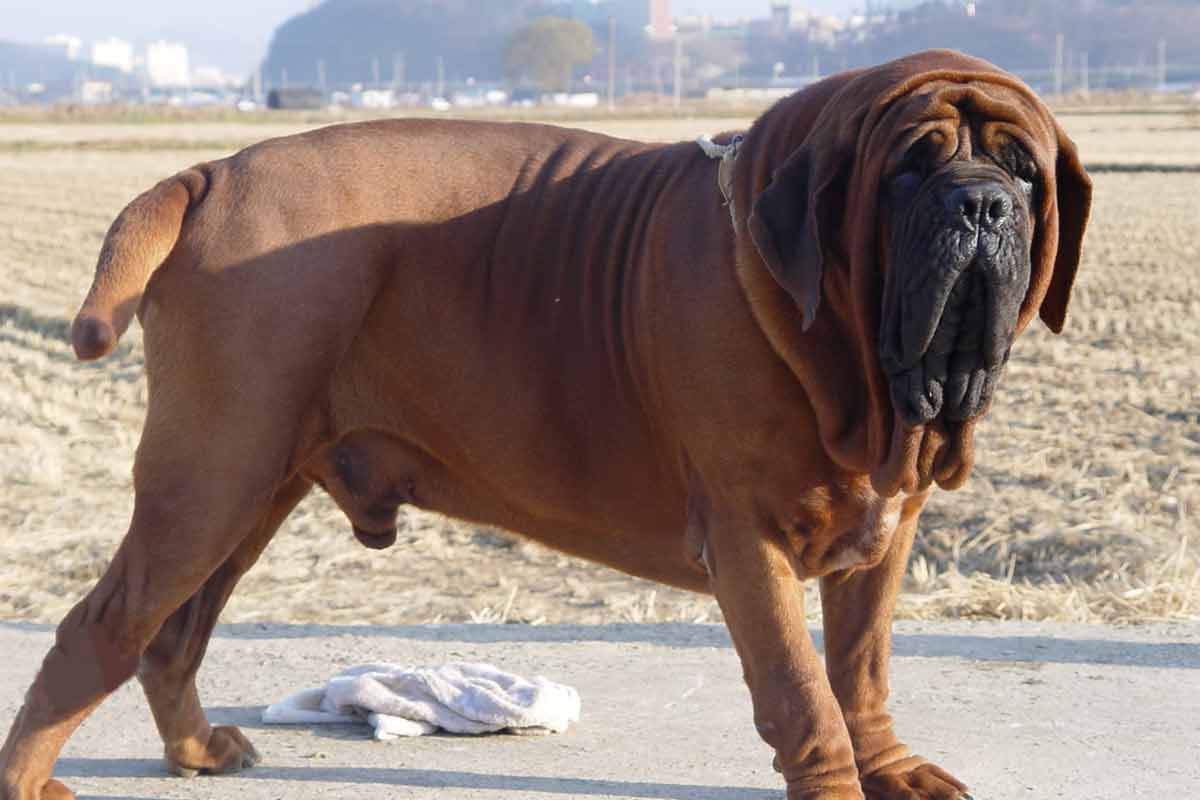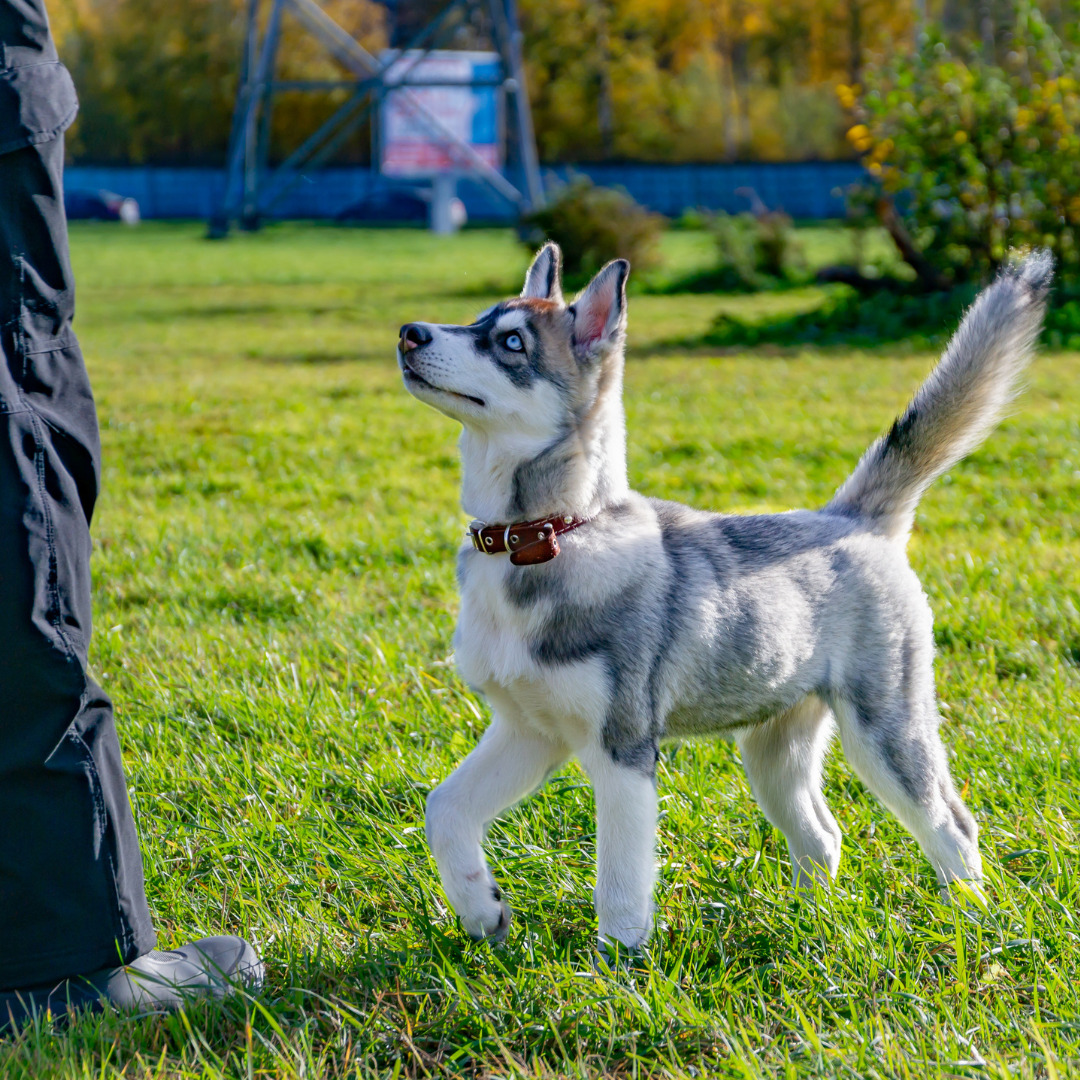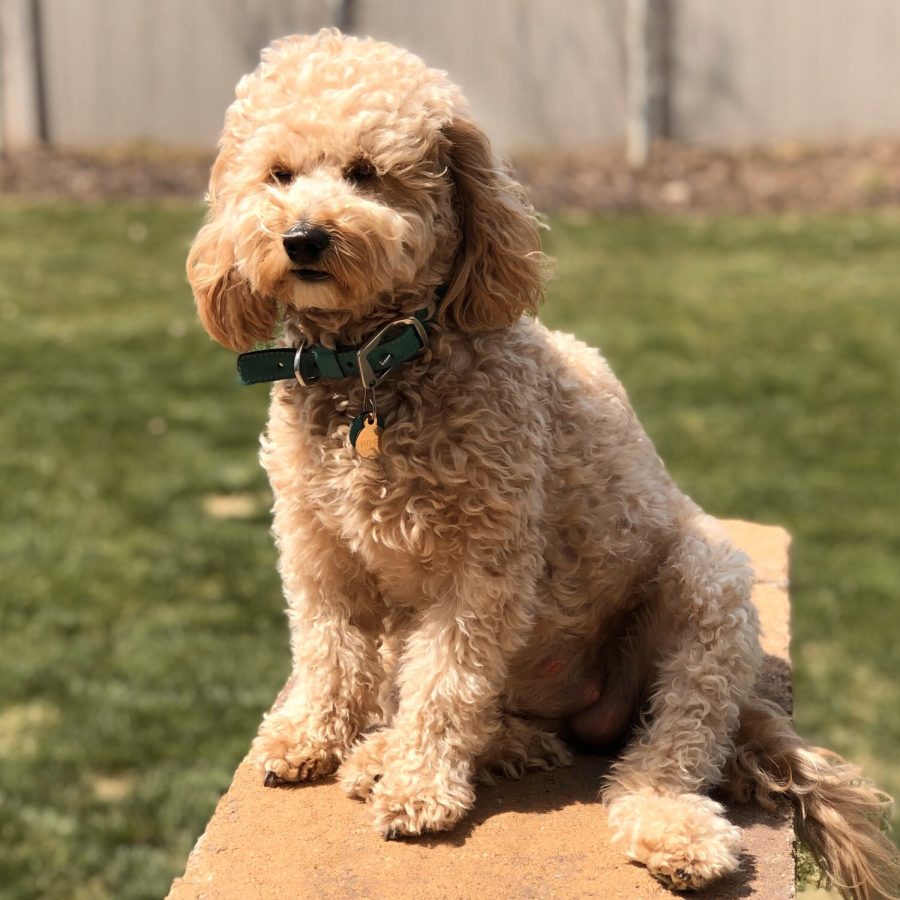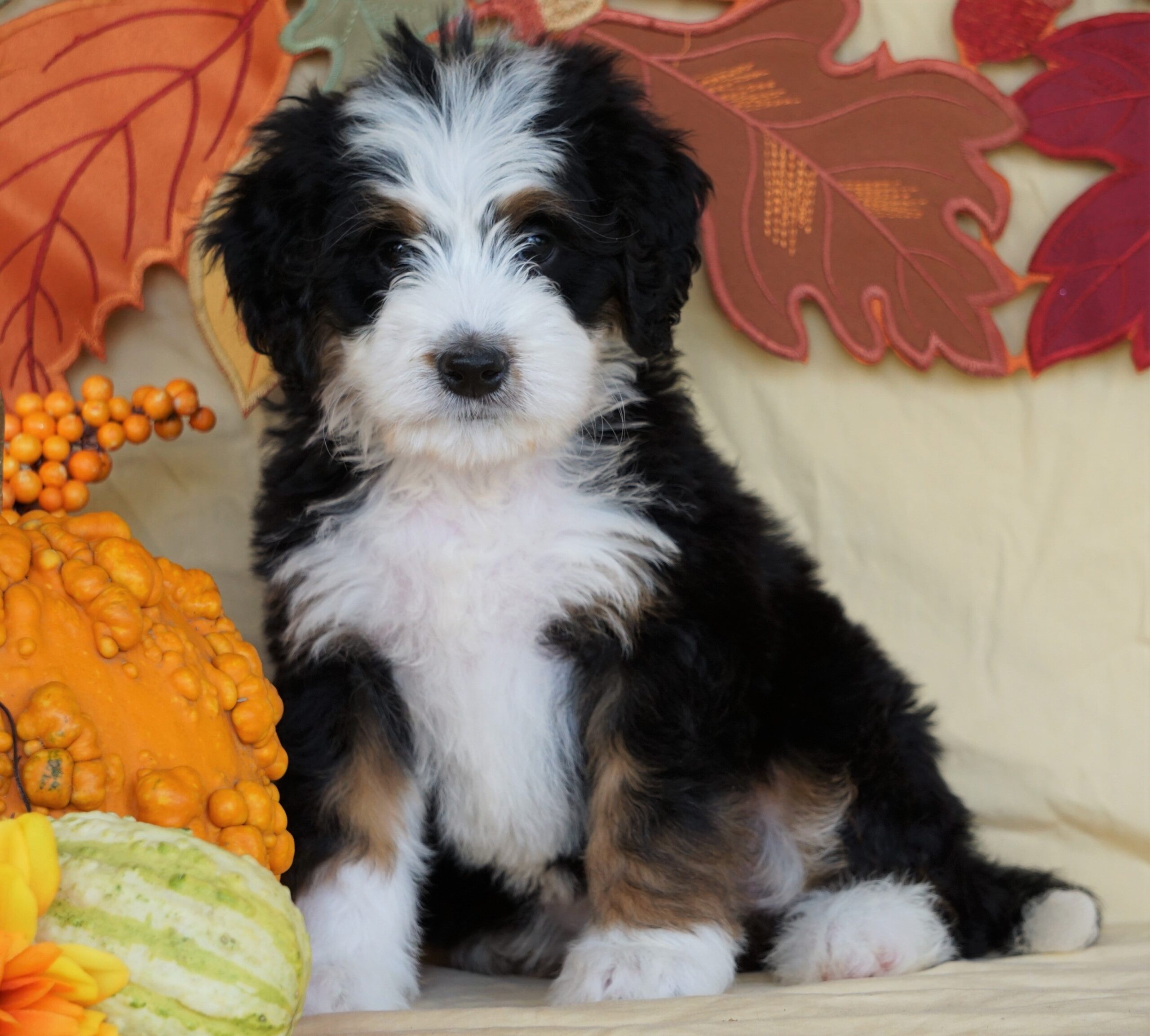The Korean Mastiff is a majestic breed known for its short, silky coat and gentle temperament. With a height range of 23.5 to 30 inches and a weight of 145 to 185 pounds, they have pronounced wrinkles and a friendly disposition. These affectionate dogs adapt well to any living environment, showcasing loyalty and intelligence. Regular grooming, exercise, and a balanced diet are vital for their well-being. If you want to discover more about their health, history, and unique characteristics, explore further details in the comprehensive breed information.
Description
With a short, silky, and shiny coat that comes in colors like chocolate, mahogany, and red, the Korean Mastiff is a dignified and easy-going large dog breed. This majestic breed typically stands between 23.5 to 30 inches in height and weighs anywhere from 145 to 185 pounds, making them quite imposing in stature.
Known for their pronounced wrinkles, especially on the face, and long, droopy ears, Korean Mastiffs have a distinctive appearance that exudes elegance. Despite their large size, they have a gentle and friendly demeanor, particularly with children, showing a remarkable level of patience and affection. The white patch on their chest is permissible and adds to their unique charm.
This breed requires daily mental and physical exercise to prevent separation anxiety and keep them content. In terms of health considerations, Korean Mastiffs may be prone to conditions like cherry eye, bloat, hip dysplasia, and genetic eye diseases, emphasizing the importance of proper care and attention.
Temperament
When considering the temperament of the Korean Mastiff, it is notable for its sweet, laid-back nature that complements its imposing physical stature. This breed is known for being gentle and friendly, especially with children, showing a dignified and easy-going demeanor.
Below are key points to understand the temperament of the Korean Mastiff:
- Gentle Giants: Korean Mastiffs are affectionate and mellow dogs, often displaying a calm and loving attitude towards their family members. Despite their large size, they are known for their gentle nature, making them suitable companions for families looking for a loving and easy-going pet.
- Loyal and Intelligent: These dogs exhibit loyalty and intelligence, traits that make them responsive to training and bonding with their owners. Their loyalty extends to being protective of their family, showcasing a sense of devotion and watchfulness.
- Adaptability and Sociability: Despite their imposing stature, Korean Mastiffs can adapt well to various living environments and social situations. With proper socialization and training, they can become well-rounded companions, showcasing good-natured behavior towards both familiar faces and strangers.
Height, Weight
The Korean Mastiff breed typically exhibits a substantial stature, with males ranging from 25.5 to 30 inches in height and weighing between 160 to 185 pounds, while females stand between 23.5 to 27 inches tall and weigh around 145 to 165 pounds. Due to their fast growth rate, a proper diet is crucial to prevent health issues such as cherry eye, bloat, hip dysplasia, and genetic eye diseases. Cherry eye, a common condition in this breed, requires surgical removal rather than tacking down.
It is important to provide a balanced diet and feeding schedule consisting of 2 to 3 small meals per day to support the Korean Mastiff’s proper growth. Regular monitoring of their weight and overall health is essential to maintain their well-being. Additionally, as a large and heavy breed, they are prone to joint problems and obesity, emphasizing the importance of appropriate care and attention to their dietary and exercise needs.
Health Problems
Common health issues observed in the Korean Mastiff breed include cherry eye, bloat, hip dysplasia, and genetic eye diseases like Entropia. These health concerns can impact the well-being and quality of life of Korean Mastiffs. To ensure the health and longevity of this breed, owners should be vigilant and proactive in addressing these potential issues.
- Cherry Eye: A common condition in Korean Mastiffs where the gland of the third eyelid prolapses, leading to irritation and discomfort. Surgical removal is often necessary to prevent further complications.
- Bloat: Also known as gastric dilatation-volvulus (GDV), bloat is a serious and life-threatening condition that requires immediate veterinary attention. Korean Mastiffs, like many large breeds, are susceptible to this condition, which involves the stomach filling with gas and twisting.
- Hip Dysplasia: A genetic condition where the hip joint does not develop properly, leading to arthritis and mobility issues. Regular monitoring, appropriate exercise, and a balanced diet can help manage this condition in Korean Mastiffs.
Living Conditions
Transitioning from discussing common health issues in the Korean Mastiff breed, it is important to consider the suitable living conditions for these large and affectionate dogs. Korean Mastiffs are adaptable to various living environments, including both city and country settings. With a moderate energy level, they tend to be on the lazier side, making them well-suited for apartment living as long as they receive daily walks or jogs to fulfill their exercise needs.
It is crucial to note that Korean Mastiff puppies should not engage in strenuous exercise due to their fast-growing bodies. While they enjoy lounging, they still require regular physical activity to maintain their health and prevent obesity. Supervision is recommended around small children to ensure that interactions are gentle and safe. Providing a comfortable and spacious living area, along with opportunities for daily walks or playtime, will contribute to the overall well-being and happiness of Korean Mastiffs.
Exercise
Regular physical activity is essential for maintaining the health and well-being of Korean Mastiffs. Due to their moderate energy levels and tendency to be lazy, it is crucial to provide them with appropriate exercise to prevent health issues and ensure their overall wellness.
Here are some key points to consider regarding exercise for Korean Mastiffs:
- Moderate Energy Level: While Korean Mastiffs may appear lazy, they still require daily walks to fulfill their primal instinct to walk and stay healthy.
- Avoid Strenuous Exercise for Puppies: Puppies of this breed should not engage in strenuous exercise due to their bone development. It is important to provide gentle activities to support their growth.
- Proper Walking Etiquette: When walking your Korean Mastiff, ensure they walk beside or behind you to establish proper human-canine communication and maintain leadership roles. This practice promotes good behavior and a healthy relationship between you and your dog.
Life Expectancy
The Korean Mastiff’s life expectancy typically ranges between 7 to 12 years, emphasizing the importance of proper care and attention to ensure their well-being throughout their lifespan.
With a lifespan of 7-12 years, Korean Mastiffs can be long-term companions for those willing to invest the time and effort into their care. To help them reach the upper end of this range, owners must provide a balanced diet, regular exercise, and routine veterinary care.
Due to their large size, Korean Mastiffs are prone to certain health issues that can impact their longevity, such as joint problems and obesity. Maintaining a healthy weight through appropriate feeding and exercise can help mitigate these risks and promote a longer, happier life for these gentle giants.
Additionally, regular check-ups with a veterinarian can help catch any potential health concerns early on, leading to better outcomes and increased quality of life for the Korean Mastiff.
Litter Size
With a typical lifespan of 7 to 12 years, the Korean Mastiff is known to have a variable litter size. The number of puppies in a Korean Mastiff litter can range from 6 to 12, with the average litter size being around 8 puppies. The size of the litter can be influenced by various factors such as the health and age of the mother, as well as genetics. Korean Mastiff puppies are usually large at birth, often weighing around 1 to 2 pounds each.
- Average litter size: Typically ranges from 6 to 12 puppies.
- Factors affecting litter size: Health and age of the mother, genetic influence.
- Puppy size at birth: Korean Mastiff puppies are usually large, weighing around 1 to 2 pounds each.
Grooming
When considering grooming for the Korean Mastiff, it is essential to establish a consistent routine to maintain the breed’s coat and overall health. This large dog with a short, silky, and shiny coat requires weekly brushing to remove loose hair and prevent mats. Additionally, cleaning the skin folds and ears regularly is crucial to prevent infections, especially due to their droopy ears.
Bathing should be done as needed, using dog-friendly shampoo to keep their coat clean and healthy. Dental hygiene is important, so regular teeth brushing and nail clipping should be part of the grooming routine. Due to their tendency to slobber, wiping their mouth and chin area may also be necessary.
Being prone to skin and ear infections, it’s vital to monitor their skin and ears for any signs of irritation or redness. By maintaining a consistent grooming schedule, you not only keep your Korean Mastiff looking its best but also contribute to its overall well-being and health.
History
Throughout the centuries, the history of the Korean Mastiff reveals a lineage deeply rooted in the traditions of South Korea.
- Origin: The Korean Mastiff, also known as the Dosa Mastiff, originated in South Korea and was primarily bred for protection and guarding purposes. They were used to protect homes, livestock, and distinguish friends from foes in rural areas.
- Historical Significance: This majestic breed played a crucial role in safeguarding Korean households and farmlands, showcasing their loyalty, courage, and protective instincts. Their imposing stature and keen sense of awareness made them valuable assets in times of need.
- Evolution: Over time, the Korean Mastiff has transitioned from a traditional guardian to a versatile companion. While still retaining their protective nature, they have also excelled in modern roles such as participating in dog shows, hiking, camping, and even showcasing their intelligence in trick performances. This evolution highlights their ability to adapt to changing societal needs while preserving their heritage.
Conclusion
In conclusion, the Korean Mastiff dog breed is characterized by its imposing stature, protective instincts, and loyal nature. Proper training, socialization, grooming, and attention to health concerns are essential for the well-being of these intelligent animals.
With a history as guard dogs and versatile companions, prospective owners should carefully consider the responsibilities involved in caring for this majestic breed to ensure a harmonious relationship and a happy, healthy life for their Korean Mastiff.




